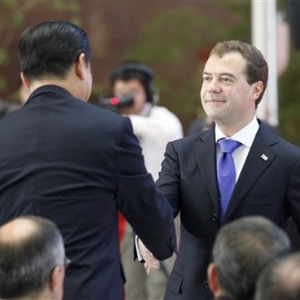Russia and China: Barriers and Motives to Unite against Iran

During recent years, economic partnership between the two countries has become profoundly stronger. Trade exchanges have increased by 30%, now reaching 120 billion dollars per year, and Russia unabashedly refers to China as its strategic partner.
Sino-Russian ties can be studied in three main fields. Dmitri Medvedev’s recent visit to China marked a major breakthrough in the field of energy cooperation that would leave its geostrategic trace on the future of regional and global arrangements. Medvedev and Hu Jintao have launched a pipeline that carries Russian oil to China. Two contracts, one for joint construction of a refinery, and one for the export of 150 billion barrels of oil to China by Russia, have been signed. Considering that Russia is the biggest regional energy producer while China is the largest consumer, these contracts carry great weight. Gas deals may also be on the way. At the end of the day, these contracts will lead to a fundamental transformation of energy relations in the region. Russia, having diversified its energy market, will reduce its dependence on the European market, and China no longer has to rely on Iran.
With regard to regional cooperation, Moscow-Beijing ties carry great weight. The Shanghai Cooperation Organization (SCO) is a basic platform for China and Russia, and the two countries have relatively similar approaches toward security issues in Central Asia and Eurasia.
At the international level, SCO, called by some the NATO of the East, will embrace a more security-oriented approach as NATO creeps toward the east. There is already an implicit cooperation between Beijing and Moscow to resist US unilateralism and a uni-polar order.
There are, nonetheless, challenges for China and Russia in the three fields mentioned. While during his visit to the city of Dalian in northeast China, where Russian soldiers once defended the city against a Japanese army, Dmitri Medvedev said the ties between Beijing and Moscow are “sealed by blood”. There is a historical suspicion, though, toward the Chinese by Moscow. Russia’s eastern region, which is one of the most sparsely populated areas in the world, is seriously threatened by Chinese immigration.
At the regional level, competition over energy sources in Central Asia and the Persian Gulf region is not something either of the countries can hide. Russia regards Central Asia and Caucasia as its backyard and border disputes, even if minor, between China on the one hand and Tajikistan and Kyrgyzstan on the other, create challenges in the region.
At the international level, Russia’s approach toward West differs from China’s and it is only in the face of mutual threats that the two countries get closer to each other. As to Iran, energy cooperation between Russia and China can strongly influence Iran. China is one of Iran’s largest energy clients, while Russia is Iran’s rival in energy exports. Although this is not a zero-sum game and all parties can reap their dividends, the Iranian diplomatic apparatus should keep an eye on what is going on between Moscow and Beijing. At the regional level, a dynamic approach by Iran, participation in regional cooperation organizations, and adjusting ties with Russia and China can help Iran to not be left behind in regional cooperation developments.
On Iran’s nuclear issue, Moscow and Beijing showed as much resistance as they could in order to alleviate pressures on Iran; nevertheless, their approaches toward the issue have diverged in the recent months. Of course, this goes back to the focus of each country in its bilateral ties with Iran; that is, while Russia had cooperated with Iran in strategic fields (e.g. military), China has pursued a trade partnership. Thus, Russia is forced to tolerate more pressures. Plus, since Medvedev’s rise to presidency Russia has slightly reoriented its foreign policy, while China is following a consistent approach. There are, however, chances of interaction between Russia and China over Iran’s nuclear issue. The Islamic Republic of Iran should try to direct these interactions towards confrontation with sanctions and pressures. A dynamic, active diplomacy and creation of new fields for cooperation with Russia, besides creating further opportunities, could help Iran in its foreign diplomacy.
Beijing and Moscow are cooperating in two distinctive fields. First, weakening the sanctions against Iran and impeding the West’s stronger presence in the region. Nevertheless, they are also wary of a nuclear Iran. Russians’ interaction with the West may encourage it to gain the support of China to take a united stance against Iran. That is, of course, not as easy as it sounds, since Beijing has more diverse interests in Iran, particularly in the commercial domain.
Mahdi Sana’ei is Head of the Center for Caucasian and Central Asia Studies and member of the Majles.

